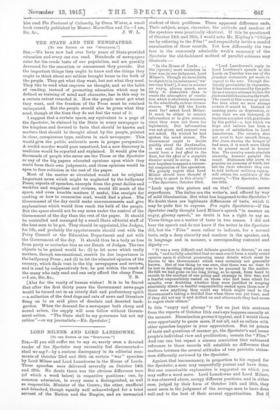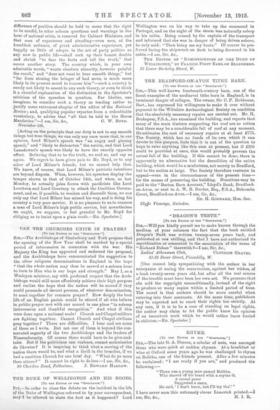LORD MILNER AND LORD LANSDOWNE.
[To THE EDITOR OP THE "SPECTATOR."' SIR,—If you will suffer me to say so, surely even a devoted reader of the Spectator may excusably feel disconcerted— shall we say ?—by a curious discrepancy in its editorial com- ments of October 23rd and 30th on certain " war " speeches by Lord Milner and Lord Lansdowne in the House of Lords. These speeches were delivered severally on October 14th and 26th. No doubt there was the obvious difference here (of which a word below) in respective positions : one, by common admission, in every sense a distinguished, as well as responsible, Minister of the Urown ; the other, unofficial and detached, though equally well acknowledged for a tried servant of the Nation and the Empire, and an unwearied student of their problems. There apparent difference ends. Their subject, scope, character, the attitude and candour of the speakers wore practically identical. If this be questioned of October 14th and 26th, I would echo Mr. Kipling's "Oblige me by referring to the Files I" and respectfully invite a candid examination of these records. Yet how differently the two fare in the commonly admirable week's summary of the Spectator the old-fashioned method of parallel columns may illustrate :— "Look upon this picture and on that." Comment seems superfluous. The italics are the writer's, and offered by way of mild illumination. But what has happened to the Spectator ? No doubt there are legitimate differences of taste, which it may be quite fair to express. Pro captu Spectatoris—if the Spectator really thought Lord Milner's speech "in manner an angry, gloomy speech," no doubt it has a right to say so. These things are a matter of taste in two senses. I did not hear the speech and do not know if the writer in the Spectator did, but the "Files" seem rather to indicate, for a normal taste, only a deep sincerity and candour in the speaker, and, in language and in manner, a corresponding restraint and dignity:— "It was a very difficult and delicate question to discuss," so one roads, "and he f ally admitted that no man could form a really sound opinion upon it without possessing many details which must be known to the Government which were certainly not generally known. But of one thing he was sure, that there was no time to be lost in deciding what policy was to be pursued in the matter. He felt we had gone on too long living, so to speak, from hand to mouth in the conduct of our policy and strategy in this war, and a fearful responsibility rested on those who had been silent for months, ever doubting whether they were justified in keeping absolutely silent—a fearful responsibility rested upon them now if there were anything they could say which might lead to the Government's taking a decided line when there was yet time, and if they did not say it and drifted on and afterwards they had cause to regret their silence."
Is this "angry and gloomy "P Yet on just this sentence from the reports of October 15th one's eye happens casually at the moment. Examination proves it typical, and I would there were opportunity to quote more, if not all, and so collate with other speeches happier in your appreciation. But let points of taste and questions of manner go, the Spectator's and lesser people's individual view and predilection; remain the "Files." And one can but repeat a sincere conviction that unbiassed reference to these records will establish no difference that matters between the several attitudes of two patriotic states- men differently reviewed by the Spectator.
Against that inoonsonancy, in proportion to his regard for the Spectator, a man may respectfully protest and have done. But one conceivable explanation is suggested on which you may suffer a word more. Lord Lansdowne and Lord Milner, it was observed above, occupy different positions, and in either case, judged by their form of October 14th and 26th, they must seem in the judgment of the average man to have done well and to the best of their several opportunities. But it "In the House of Lords . . the [speech] most mistaken in tone was, in our judgment, Lord Milner e. Though we have little to object to in its substance ['we' are very kind I], it was in manner an angry, gloomy speech, more likely to dishearten than to create the atmosphere of resolu- tion which is absolutely necessary in the admittedly serious circum- stances. What did the Lords meet for? asked Lord Milner. It must be either to receive information or to give counsel, since they were not there for legislation. But information was not given and counsel was not asked. He wished he had spoken his mind sooner. The Government ought to decide quickly about the Dardanelles. It was said that withdrawal would have a bad effect in the East, but the effect of a complete disaster would be worse. It was now hopeless to expect a success- ful completion of the operation. We greatly regret that Lord Milner should have thought it his duty to speak in this strain." —The Spectator, October 23rd. "Lord Lansdowne's reply to Lord Loreburn's speech in the Lords on Tuesday was one of the frankest statements yet made in regard to the war. Though dis- tinctly pessimistic in character, it has been welcomed by the pub- lic as a sincere attempt to face the facts and tell the country the truth. The result of this course of action has been what we were always certain it would be. Instead of causing panics or depression, or cries that we are betrayed, it has been accepted with gratitude by the public—a fact which we hope and believe has been a source of satisfaction to Lord Lansdowne. The country does not want to hear smooth things. Par from stoning the bringer of bad news, it is much more likely in its present mood to honour him. The country wants absolute sincerity, however painful the result. Statesmen who scorn to practise an economy of truth, but tell the facts wherever they can be told without military injury, will obtain the confidence of the country."—The Spectator, Octo- ber 30th. difference of position should be held to mean that the right to be candid, to utter solemn questions and warnings in the hour of national crisis, is reserved for Cabinet Ministers, and that men of experience and standing—even men, at the humblest estimate, of groat administrative experience, yet happily as little of adepts in the art of party politics as any now in public life—shall cork up their honest doubts and shrink "to face the facts and tell the truth," that seems another story, The country which, in your own admirable words, "wants absolute sincerity, however painful the result," and "does not want to hear smooth things," but "far from stoning the bringer of bad news, is much more likely in its present mood to honour him "—such a country is surely not likely to assent to any such theory, or even to think it a cheerful explanation of the distinction in the Spectator's criticism of the speeches in question. Far likelier, one imagines, to consider such a theory as tending rather to justify some extremest chapter of the editor of the National Eeriest; and, qualifying popular repartee from a redoubtable vocabulary, to advise that " all that be told to the Horse [Acting on the principle that our duty is not to say smooth things but true things, we can only say once more that, in our opinion, Lord Milner's speech was "an angry and gloomy speech," and " likely to dishearten" the nation, and that Lord Lansdowne's speech was likely to have the exactly opposite effect. Believing that to be the truth, we said so, and say so again. We regret to have given pain to Mr. Boyd, or to any other of Lord Milner's friends, but we cannot help that. We know, of course, that Lord Milner's patriotic intentions are beyond dispute. When, however, his speeches display the temper shown in that of October 14th, and when, as last Monday, he actually joins forces with paciflciets like Lord Loreburn and Lord Courtney to attack the Coalition Govern- ment, and so, if possible, to weaken and discredit them, we can only say that Lord Milner has missed his way, and is doing his country a very poor service. It is no pleasure to us to censure a man of Lord Milner's high public service, but nevertheless we ought, we suppose, to feel grateful to Mr. Boyd for obliging us to insist upon a plain truth.—ED, Spectator.]







































 Previous page
Previous page